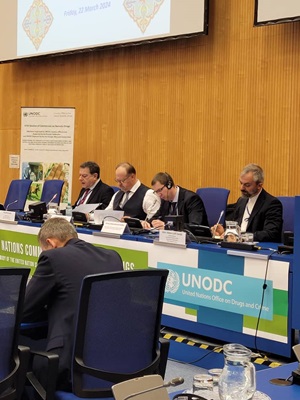UNODC Country Office in Iran holds an event in Vienna on Drug Trafficking Regional Trend with focus on Iran on the sideline of the 67th Session of the Commission on Narcotic Drugs
|
|
Vienna, 22 March 2024 - The UNODC Country Office in Iran organized a side event on “Understanding the Changing Illicit Drug Trafficking Trends in West and Central Asia and Developing Evidence-Informed, Tailored and Proactive Responses through Capacity-building Interventions”. The event was held on the sideline of the 67th Session of the Commission on Narcotic Drugs (CND). The purpose was to highlight Iran’s efforts on drug control at regional and international level. The event was supported by the Russian Federation and UNODC Regional Section on Europe, West and Center Asia in Vienna.
The event was opened by Tofiq Murshudlu, the Officer-in-Charge of the Regional Section on Europe, West and Central Asia. He reiterated the importance of mechanisms of cooperation at political level, including Memorandum of Understanding on sub-regional drug control cooperation in Central Asia and Triangular Initiative, as well as at operational level, such as Central Asian Regional Information and Coordination Centre (CARICC) and Joint Planning Cell (JPC). He further made reference to rapid decrease in poppy cultivation and opium production in 2023 as well as methamphetamine manufacture in Afghanistan and drastic increase in seizures of methamphetamine in states in the region. He further emphasized on the need to adjust joint responses based on recent developments, and recognition of counter narcotics activities as a shared responsibility.
Alexander Fedulov, UNODC Iran Country Representative, gave a detailed presentation on major routes of drug trafficking from Afghanistan to the third market in European countries, moving on to trend and situation of drugs in the region and specifically in Iran, and gave special emphasis on heroin and methamphetamine manufacture in Afghanistan and trafficking and seizure trends in Iran as well neighbouring countries. The presentation also illustrated a comparison of seizures made in Iran with the seizures on neighbouring countries, showing that despite significant decrease in opiates seizures in Iran since 2022, Iran still accounts for having the highest amounts of seizures of opiates, compared to its neighbouring countries as well as the rest of the world. He further introduced UNODC and Iran joint cooperation in the field of supply reduction, demand reduction as well as at regional level, referring to the recent Ministerial meeting and Senior Officials meeting within Triangular Initiative among UNODC, Iran and Pakistan that took place in Tehran in June 2023.
UNODC Country Office in Iran has been actively present in the Islamic Republic of Iran since 1999 and considers Iran as one of the strategic partners for drug control and crime prevention in the region and has been supporting the Islamic Republic of Iran by providing technical assistance and trainings for years ever since its establishment.
Amir Abbas Lotfi Sarabi, Director General of the International Relations Office of the Iranian Drug Control Headquarters, also delivered a statement on Iran's situation on drugs and achievements Iran has had in the field of drug control.
The Commission on Narcotic Drugs (CND) was established by Economic and Social Council (ECOSOC) resolution 9(I) in 1946, to assist the ECOSOC in supervising the application of the international drug control treaties. In 1991, the General Assembly (GA) expanded the mandate of the CND to function as the governing body of UNODC. The CND's agenda has two distinct segments: a normative segment for discharging treaty-based and normative functions; and an operational segment for exercising the role as the governing body of UNODC.
The CND meets annually and adopts a range of decisions and resolutions. Intersessional meetings are convened throughout the year. Towards the end of each year, the Commission meets at a reconvened session to consider budgetary and administrative matters as the governing body of the United Nations drug programme.
Presentation made by the UNODC Iran Country Representative



